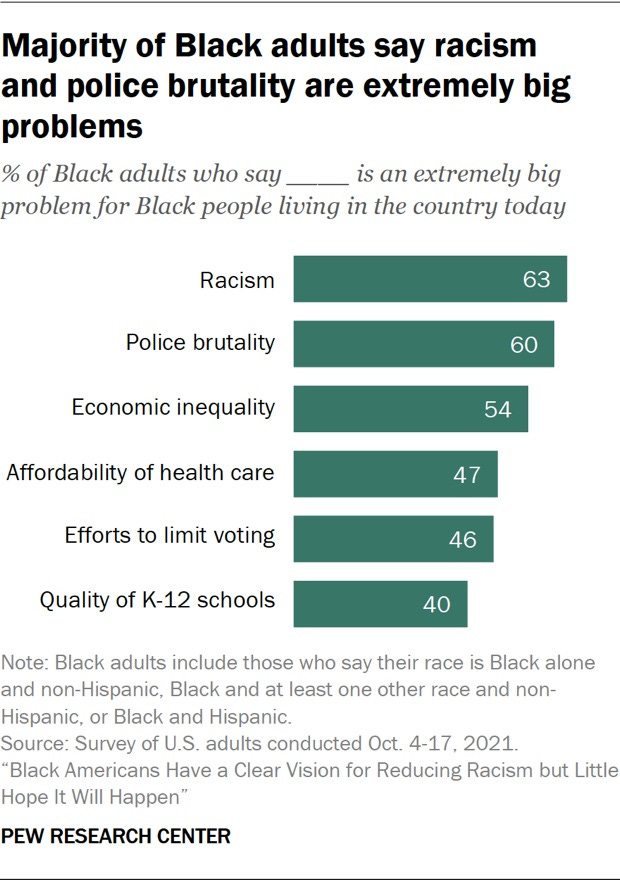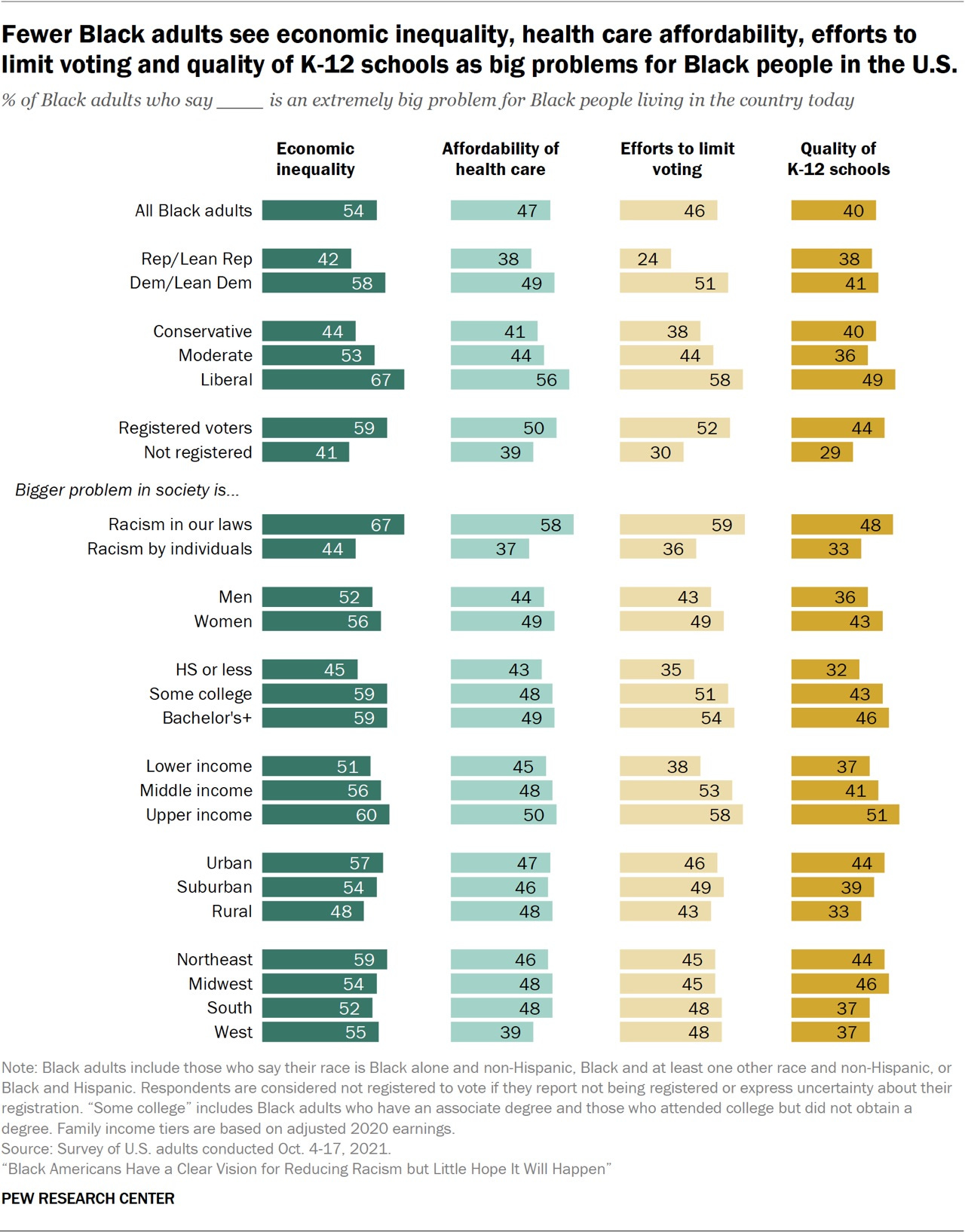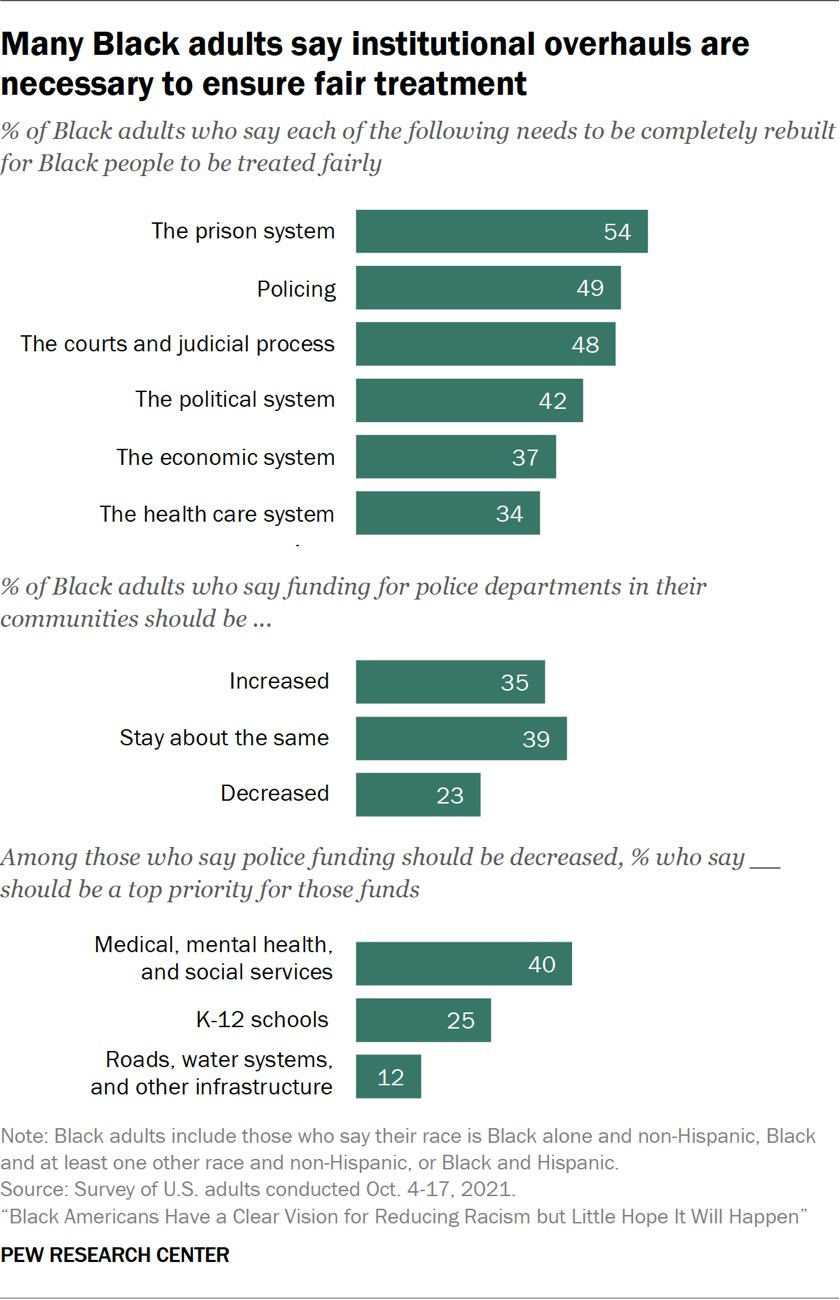The Reality of Black Solidarity
Clifton Roscoe on the Loury-Woodson-Foster-Steele debate
My recent debate with Robert Woodson, Kmele Foster, and Shelby Steele on the ethics of black identity has provoked a lot of commentary. The one that elicited some of the most heated debate amongst the four of us was that of racial solidarity. Kmele and Shelby argued that race, as an outmoded and perhaps incoherent concept, no longer makes sense as the foundation of broad coalitions. Bob and I argued, however, that it makes tactical sense to use race as one basis to spur collective action. Additionally, many people (including me!) still do draw meaning and sustenance from their racial identity.
We were all speaking our minds, but it can be clarifying to ask what Americans more broadly think of this question. Enter Clifton Roscoe, who comes to us yet again with a data-driven consideration of the efficacy of appeals to racial solidarity. As he points out, even if we desire a world in which race isn’t important, we don’t live in that world yet. I appreciate Clifton’s clear-eyed and unsentimental analysis of the problem. We’ve got the data. The question is, what do we do with it?
This post is free and available to the public. To receive early access to TGS episodes, an ad-free podcast feed, Q&As, and other exclusive content and benefits, click below.
Dear Glenn,
So many thoughts crossed my mind while I listened to that conversation. They were distracting, so I listened to the conversation again a little while ago. My overall take didn't change much, but I hope I can answer your question—”Are we ready to abandon racial solidarity?”—in a way that's helpful.
Context matters. I couldn't help but wonder if the moderator and the panelists represent today's Black America. It would have been helpful, for example, if a middle- or low-income single black woman with kids was part of the discussion. It might have been helpful if somebody other than Reihan Salam had moderated the conversation. While he's smart and articulate, I don't think he knows Black America well enough to frame and guide the conversation as well as a more knowledgeable moderator could. He didn't seem comfortable interrupting four black men with strong opinions, but there were times when the conversation was disjointed and it would have been helpful for somebody to herd the cats.
What's the definition of blackness today? Most of us had a good idea of what it meant to be “colored,” a “Negro,” or “black” 50-60 years ago. We knew who our leaders were, we had a common understanding of the primary issues facing black folks, we generally agreed on what needed to be done to address those issues, and we had strong institutions within Black America that pulled in the same direction. These things, combined with culture, gave us a sense of shared identity and purpose. Many of us felt an obligation to further the work of those who came before us and to help open doors for those coming behind us. Black America is in a very different place today. Are we “black,” “African American,” or part of something called “BIPOC”? Who are our leaders? How relevant are our institutions? What passes for black culture these days?
A recent Pew analysis suggests that Black America is essentially leaderless. About 30% of respondents said Barack Obama is the most important black leader today. Kamala Harris came in second at 8%:
We don't have strong institutions either. Here's are more graphics from Pew:
What are our issues? These graphics from Pew tell us a lot:
They suggest that Shelby Steele is right when he says that “modernity” is Black America's biggest issue. We're not prepared to thrive in a world where overt racism has mostly disappeared. Part of the problem is that what passes for black leadership today is rooted in the past. Too many of us are focused on the wrong things (e.g., fighting racism, policing reforms, criminal justice reforms, voting rights). None of these things will close the K-12 academic achievement gap. There's no way that Black America will ever achieve equality or that any of the most talked about racial gaps (e.g., employment, income, wealth, home ownership, life expectancies, crime victimization rates, incarceration rates, etc.) will close until our children can read and do math as well as their peers. Not many people want to wrestle with this. It's easier to blame various forms of racism (e.g., structural, institutional, systemic, etc.) for black failures than to confront the internal issues (e.g., cultural, broken family structures, weak leadership, etc.) that stifle black progress. These graphics from Pew reflect this:
The disconnect is that too many of us believe racism holds us back and that we can't be successful until America's institutions are overhauled. Older black folks think government can force change, so they support political action. They sidestep the issue of how little progress has been made since the late 1980's even as black political power grew in strength. Young people who came of age during the Obama presidency have seen the limits of politics and don't embrace them as strongly as their elders.
To make a long story short, I saw the merits of all the arguments that were made. There may come a time when race isn't important, but we're not there yet. Another Pew analysis from April shows the importance of race to most black folks.
There's no way around this, so the arguments you and Bob Woodson made were stronger than those made by Steele and Foster. The problem is that today's black leadership and black institutions aren't up to snuff. This relates to Kmele Foster's question of whether we should refurbish black leadership and institutions or if we should abandon them (my words, not his). I'm sympathetic to the latter approach, but it wouldn't yield good outcomes. People, especially those at the lower rungs of society, need leaders and institutions. Black America isn't at a point where most of us have faith in "white" institutions and leaders, so we have to strengthen their black counterparts if the goal is to put Black America on a better path.
I could write about this stuff forever, but I'll stop.
Clifton












The legitimizing of race as a foundational way of seeing and acting on the world is the problem. If Blacks see race as does Loury:
“Bob and I argued, however, that it makes tactical sense to use race as one basis to spur collective action. Additionally, many people (including me!) still do draw meaning and sustenance from their racial identity.”
Then they cannot also complain about others doing the same - the root of their absurd & self-serving uber-racist CRT campaign of anti-whiteness.
I return again to Sidney Poitier speaking to his dad in “Guess who’s coming…”
“You see yourself as a Black man. I see myself as a man.”
We won’t get along until we are there. It’s certainly probable that we shouldn’t… until we reach that goal.
And this is ENTIRELY on Blacks. Every possible advantage has been provided. They have rejected each more with every passing year.
In the early 1990s, I was an IBM Systems Engineer assigned to LAUSD. I spent nearly all of one week on-site at Crenshaw HS, the middle of the inner city, debugging various LANs. Listened to kids every single day accuse any & every kid who took home books for homework of “acting white.” Listened to a history teacher tell kids they’d get extra credit for going to hear Louis Farrakhan speak.
These are not things anyone outside their community & culture can fix. And they never will be fixed as long as they hide behind race instead of standing out for humanity.
"Even if we desire a world in which race isn’t important, we don’t live in that world yet."
Why don't we?
Who or what or why or where or how is 'race STILL being made important' in this, our particular world...that we would otherwise choose (maybe??) to change?
Our laws are not race-centric; our organizations do not hire, fire, or promote on the basis of race (and let us ignore, yet again, affirmative action). There are no venues which admit or refuse admittance because of skin color. No schools which gauge entry by melanin. No institutions which determine policy per skin tone. No banks whose loans decisions are made by race. No neighborhoods in which home sales are a function of dark or light. These things aren't happening and haven't happened for generations.
And if, in some stagnant backwater, we do indeed discover such racist practices, our media highlights them; America deplores them; and the Justice System eliminates them. This truth has been demonstrated over and over again for decades (even to ridiculous extremes).
So what is it, exactly, and who is it, exactly who keeps insisting that 'race is important' ...so important, in fact, that their insistence actively prevents us from achieving the 'post-racial' world we supposedly desire?
The answer is .... Black Adults. That's who's insisting. (As Pogo might say, 'We have met the enemy and he is us!')
95% of all Black adults say race is important to how they see themselves." 54% say it is EXTREMELY important. Skin color, in other words, is critical to a sense of self if that 'self' is Black. None of the other colors really seem to care.
So what's this mean?
If...we truly desire a world in which skin color is unimportant....WHY do we keep behaving as though skin color is critically important? If the institutions, organizations, policies and practices of the world are explicitly set to ignore race, why does one Race continue to insist that race must be emphasized, even as they say they prefer a world in which it isn't?
At a fundamental level, skin color is simply a demographic marker -- no more, no less. Some of us are tall, some short. Some of us are fat; some thin. We are old; we are young; we have big feet & small feet, long hair and short, curly & straight...red hair, dark hair, blonde hair, no hair. We are Black, White, Tan, Brown, Sepia, etc.. These are all just simply demographic tags which have absolutely nothing to do with who we actually are as human beings. They have nothing to do with what we can achieve or whether or not we can build a good & decent life for ourselves and our families. Nothing, that is, unless we listen to that demonic voice whispering in our ear: "COLOR is what & who I am!"
The data from the Pew Survey is sad.
We are told that there is "little hope among Black adults that changes to racial inequality are likely". But what are those desired 'changes' for which there's little hope?
It's just outcome rebalancing. It's not behavior changing; it's not working harder; it's not better study habits, better graduation rates, better learning, better job performance, etc. It's not saying no to teenage sex and accidental pregnancies and astronomical, out-of-wedlock birthrates & single-parent households filled with lost children No...it's none of those things. Rather it's White People giving Black People dollars because Black. It's White People giving Black People dollars because of the incredibly perverse belief that White Babies in Newborn Nurseries are born holding a past-due bill to the Black Newborn who lies next to them.
This is insane. The White child is not born in debt; the Black child is not born with an account receivable.
Half of all Black adults surveyed tell us that they believe the World needs to be REBUILT ENTIRELY in order for them to be 'treated fairly'. They say that Reality itself must shift in order for them to be as successful as White People.
Should we stop measuring 100m. dash winners across a 100m distance with the same start and finish lines? Should we eliminate standard Board Scores because test results from Standard Tests yield racial imbalances? (Wait, we've already done that) Should we substitute an essay on 'me' for a GPA? Should we just draft people for Medical School and eliminate performance hurdles because it's more important to see MORE BIPOC Cardiologists than to graduate good ones who can pass tests? Again this is insane. (especially insane if it's my heart they're operating on!)
If 63% of Black Adults say racism is an 'extremely big problem'....shouldn't someone ask, "What Racism??" Shouldn't we able to see the racist law, the racist policy, the racist procedure, the racist behavior that actually proves this assertion and provides strong evidence for this belief? Absent that proof, outcome imbalance is simply outcome imbalance, and proves nothing. How many times must that be said? If you beat me 10/10 times in that 100m. dash, I'm betting it's because you're faster....not because the race is fixed.
If I find myself convinced that the World must change in order for me to be successful....if I come to believe that everyone else is wrong and I'm the only one who's right....then maybe it's me and not the world who needs to wake-up? Maybe it's me and not the world who needs to change? And maybe that change needs to begin by recognizing who I am as a human being has nothing to do with how I look and everything to do with what I do.